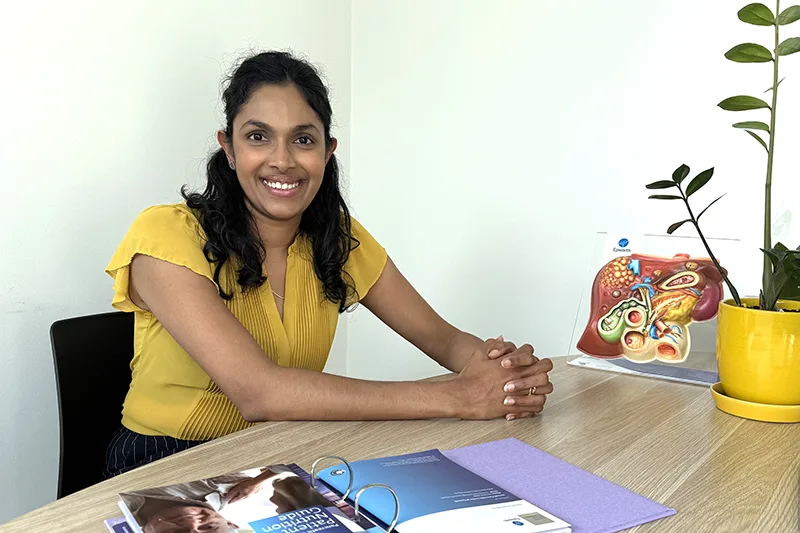Niti joined the Jreissati Pancreatic Centre in February 2025 as the Centre’s first dedicated dietitian, a role made possible through generous philanthropic donations. In just a few months, she has supported more than 50 patients and is leading new research into how nutrition support can be better integrated into pancreatic cancer care.
We asked Niti to tell us more about her role, her approach to care, and what drives her passion for this work.
What led you to pursue a career in dietetics, and what drew you to working in pancreatic cancer?
I have always been fascinated by how food affects the body and mind. Throughout my career, I have supported people through a range of dietary challenges, but pancreatic cancer brings a unique complexity. Patients often face malabsorption, significant weight loss, and metabolic changes, which can be overwhelming without specialist support. This role allows me to combine compassionate care with evidence-based nutrition, which is exactly why I became a dietitian.
What does a typical day look like for you at the Centre?
Each day, I identify patients due for routine check-ins and those starting treatment who may need additional support. I also look for patients who may be eligible for clinical trials. During consults, I develop tailored care plans and provide practical meal planning advice to help maintain nutrition.
Collaboration is central to my role. I stay in regular contact with the healthcare team to ensure my advice aligns with each patient's treatment. I also offer on-call support, and patients can reach out to me directly if they need urgent nutritional advice. The dynamic nature of pancreatic cancer means no two days are the same, and I adapt my approach to meet each patient's changing needs.
What do you find most rewarding about your role?
I’ve seen first-hand how impactful tailored nutrition support can be. Many patients have told me that dietetics input has been a game-changer for their energy, confidence, and quality of life. It’s very rewarding to work alongside patients as they reach their goals, especially when food starts to feel manageable again.
How are philanthropic donations making a difference in your work?
Philanthropic funding has allowed me to work closely with patients who might not otherwise have access to specialist dietetic care. It also supports our research and will help us grow the dietetics service in future, so we can reach more people and offer more frequent reviews. We’re also using these funds to lead a research project, DINE-PC, which looks at how we can integrate nutrition support early in the treatment journey.
What’s one thing you wish more people understood about nutrition and pancreatic cancer?
Many people believe that sugar “feeds” cancer or that cutting carbohydrates will slow its growth. But all cells, including healthy ones, need glucose for energy, and your body will create it from other sources if needed.
There’s also a lot of hype about “superfoods”, but no single food can prevent or cure cancer. The most helpful approach is a balanced diet that meets your needs and supports your treatment.
Can you tell us about your research and what you hope it will achieve?
We’re currently running DINE-PC, a research project supported through philanthropic funding. It explores how we can integrate dietetics support early in the treatment pathway, particularly for people starting chemotherapy.
The aim is to understand how ongoing support can improve patient outcomes and quality of life and how to make this part of routine care.
We’re also contributing to SuperQoL, a collaborative project with Monash University that looks at the value of intensive dietetics programs for people with pancreatic cancer.
Outside of work, what do you enjoy doing?
Outside of work, I love spending time with my two sons. We enjoy baking, cooking, puzzles and bike rides together. I also unwind by exercising with my husband, especially kickboxing routines, which help me clear my head and recharge both as a mum and a professional

